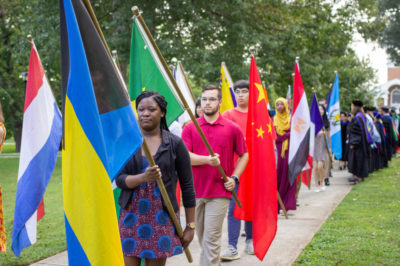Dr. Kenneth Garren, the University of Lynchburg’s president, has signed a letter to Congress aimed at protecting international students at U.S. colleges and universities.
The letter, prepared by the Washington, D.C.-based American Council on Education, is in response to a recent announcement by the U.S. Department of Homeland Security regarding the status of international students, should classes go exclusively online this fall due to COVID-19.

As reported in The Washington Post last week, “the federal Student and Exchange Visitor Program announced, ‘The U.S. Department of State will not issue visas to students enrolled in schools and/or programs that are fully online for the fall semester nor will U.S. Customs and Border Project permit these students to enter the United States.’”
Quoting the announcement, the Post continued, “Active students currently in the United States enrolled in such programs must depart the country or take other measures, such as transferring to a school with in-person instruction to remain in lawful status. If not, they may face immigration consequences including, but not limited to, the initiation of removal proceedings.”
The ACE letter asks Congress to encourage Homeland Security to rescind this directive or, if the federal agency refuses to do so, “swiftly pass legislation that grants needed flexibility for our international students and institutions during the global pandemic.”
In an email to the campus community last week, Garren and President-elect Dr. Alison Morrison-Shetlar vowed to do whatever they could to protect Lynchburg’s international students. Signing the ACE letter is part of that effort.
“Please be assured that the University is doing everything it can to keep our international students engaged and on campus,” they wrote. “According to the new regulations, international students are permitted to remain in the United States as long as their classes are not offered solely online.
“Our opening plans call for a mixture of in-person, hybrid, and online classes. Thus, we are encouraging faculty and advisors to work with students to ensure a mix of course delivery mechanisms for the fall term.”
Garren and Morrison-Shetlar also expressed their affection for Lynchburg’s 30-plus international students, who hail from 15 different countries.
“Our international students are a valued part of the Lynchburg family and they enrich our experience and that of our students in so many ways,” they wrote. “While their numbers are small here at the University, their impact is large — academically, culturally, and socially.
“Our friends and classmates from around the world bring a welcome worldview to our living and learning experience.”

